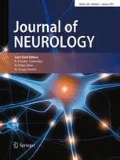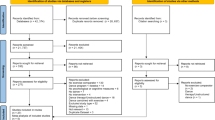Abstract
Background
Few studies have evaluated the impact of physical activity (PA) on cognition and fatigue, and none have considered the effects of PA on the relationship between cognition and fatigue.
Objectives
We evaluated the effect of PA in people with multiple sclerosis (pwMS) in a 6-month-long single-blind randomized controlled trial. We focused on the impact of exercise on cognition, fatigue, and the relationship between cognition and fatigue.
Methods
We recruited pwMS, who were then randomly assigned 1:1 to either a PA protocol group or a control group (CG). All patients underwent assessments using the Brief International Cognitive Assessment for Multiple Sclerosis including symbol digit modality test (SDMT), Berg Balance Scale (BBS), gait analysis, 6-Minute Walk Test, Timed Up and Go (TUG) test, and the Modified Fatigue Impact Scale (MFIS) at the beginning of the study (T0), at the end of the study (EOS) 24 weeks after T0, and at 24 weeks following the EOS (FU).
Results
A Wilcoxon test revealed a significant effect of exercise in the PA group, but not in the CG. Significant differences between T0 and EOS were found in the spatiotemporal parameters of gait, and performance on the SDMT, TUG, BBS, and MFIS. These differences were also present during the FU period. A regression model revealed that the baseline MFIS score predicted processing speed improvement (R2 = 0.65, p < 0.01), as the SDMT T score increased by 0.3 for each one-unit increase in the MFIS score at T0.
Conclusion
PA affects multiple aspects of the pathology in pwMS. Patients with greater fatigue must not be discouraged from exercise, as they may greatly benefit from PA. Specifically, PA was shown to improve information processing speed.
Similar content being viewed by others
References
Giesser BS (2015) Exercise in the management of persons with multiple sclerosis. Ther Adv Neurol Disord. 8(3):123–130. https://doi.org/10.1177/1756285615576663
Sandroff BM, Sosnoff JJ, Motl RW (2013) Physical fitness, walking performance, and gait in multiple sclerosis. J Neurol Sci 2013(328):70–76
Sandroff BM, Motl RW (2012) Fitness and cognitive processing speed in persons with multiple sclerosis: a cross-sectional investigation. J Clin Exp Neuropsychol 34(10):1041–1052. https://doi.org/10.1080/13803395.2012.715144 (Epub 2012 Aug 21)
Jørgensen M, Dalgas U, Wens I et al (2017) Muscle strength and power in persons with multiple sclerosis—a systematic review and meta-analysis. J Neurol Sci 15(376):225–241. https://doi.org/10.1016/j.jns.2017.03.022 (Epub 2017 Mar 18)
Sá MJ (2014) Exercise therapy and multiple sclerosis: a systematic review. J Neurol 261(9):1651–1661. https://doi.org/10.1007/s00415-013-7183-9 (Epub 2013 Nov 22)
Briken S, Gold SM, Patra S et al (2014) Effects of exercise on fitness and cognition in progressive MS: a randomized, controlled pilot trial. Mult Scler 20:382–390
Morrison JD, Mayer L (2017) Physical activity and cognitive function in adults with multiple sclerosis: an integrative review. Disabil Rehabil 39(19):1909–1920. https://doi.org/10.1080/09638288.2016.1213900 (Epub 2016 Oct 20)
Pilutti LA, Greenlee TA, Motl RW et al (2013) Effects of exercise training on fatigue in multiple sclerosis: a meta-analysis. Psychosom Med. 75(6):575–580. https://doi.org/10.1097/psy.0b013e31829b4525 (Epub 2013 Jun 20)
Morrow SA, Weinstock-Guttman B, Munschauer FE et al (2009) Subjective fatigue is not associated with cognitive impairment in multiple sclerosis: cross-sectional and longitudinal analysis. Mult Scler 15:998–1005
Triche EW, Ruiz JA, Olson KM et al (2016) Changes in cognitive processing speed, mood, and fatigue in an observational study of persons with multiple sclerosis treated with dalfampridine-ER. Clin Neuropharmacol. 39(2):73–80. https://doi.org/10.1097/wnf.0000000000000130
Polman CH, Reingold SC, Banwell B et al (2011) Diagnostic criteria for multiple sclerosis: 2010 revisions to the McDonald criteria. Ann Neurol 69:292–302
Lechner-Scott J, Brunnschweiler H, Kappos L (1995) The Study Steering Committee. Is it possible to achieve crosscultural European agreement in the assessment of neurological deficits? First experience in the European interferon beta-1b trial for secondary progressive MS. J Neuroimmunol 42(Suppl 1)
Schulz KF, Grimes DA (2002) Generation of allocation sequences in randomized trials: chance, not choice. Lancet 359(9305):515–519
Pau M, Corona F, Coghe G et al (2018) Quantitative assessment of the effects of 6 months of adapted physical activity on gait in people with multiple sclerosis: a randomized controlled trial. Disabil Rehabil 40(2):144–151. https://doi.org/10.1080/09638288.2016.1244291 (Epub 2017 Jan 13)
Goretti B, Niccolai C, Hakiki B et al (2014) The Brief International Cognitive Assessment for Multiple Sclerosis (BICAMS): normative values with gender, age and education corrections in the Italian population. BMC Neurol. 10(14):171. https://doi.org/10.1186/s12883-014-0171-6
Kos D, Kerckhofs E, Carrea I et al (2005) Evaluation of the Modified Fatigue Impact Scale in four different European countries. Mult Scler. 11(1):76–80
Pau M, Coghe G, Atzeni C et al (2014) Novel characterization of gait impairments in people with multiple sclerosis by means of the gait profile score. J Neurol Sci 345(1–2):159–163. https://doi.org/10.1016/j.jns.2014.07.032 (Epub 2014 Jul 19)
Magnani S, Olla S, Pau M et al (2016) Effects of six months training on physical capacity and metaboreflex activity in patients with multiple sclerosis. Front Physiol. 7:531 (eCollection 2016)
Dalgas U, Stenager E, Ingemann-Hansen T (2008) Multiple sclerosis and physical exercise: recommendations for the application of resistance-, endurance- and combined training. Mult Scler. 14:35–53
Benedict RH (2005) Integrating cognitive function screening and assessment into the routine care of multiple sclerosis patients. CNS Spectr 10:384–391
Malcay O, Grinberg Y, Berkowitz S et al (2017) Cognitive-motor interference in multiple sclerosis: what happens when the gait speed is fixed? Gait Posture. 57:211–216. https://doi.org/10.1016/j.gaitpost.2017.06.024 (Epub 2017 Jun 23)
Andreasen AK, Spliid PE, Andersen H et al (2010) Fatigue and processing speed are related in multiple sclerosis. Eur J Neurol 17:212–218
Vanotti S, Smerbeck A, Eizaguirre MB et al (2017) BICAMS in the Argentine population: relationship with clinical and sociodemographic variables. Appl Neuropsychol Adult 1–10. https://doi.org/10.1080/23279095.2017.1323751
Sandi D, Rudisch T, Füvesi J (2015) The Hungarian validation of the Brief International Cognitive Assessment for Multiple Sclerosis (BICAMS) battery and the correlation of cognitive impairment with fatigue and quality of life. Mult Scler Relat Disord. 4(6):499–504. https://doi.org/10.1016/j.msard.2015.07.006 (Epub 2015 Jul 8)
Pokryszko-Dragan A, Zagrajek M, Slotwinski K, Bilinska M, Gruszka E, Podemski R (2016) Event-related potentials and cognitive performance in multiple sclerosis patients with fatigue. Neurol Sci 37(9):1545–1556. https://doi.org/10.1007/s10072-016-2622-x (Epub 2016 Jun 6)
Jougleux-Vie C, Duhin E, Deken V et al (2014) Does fatigue complaint reflect memory impairment in multiple sclerosis? Mult Scler Int. https://doi.org/10.1155/2014/692468 (Published online 2014 Mar 2)
Author information
Authors and Affiliations
Corresponding author
Ethics declarations
Conflicts of interest
The authors report no conflicts of interest.
Ethical standard
The study was carried out in compliance with the Declaration of Helsinki and was approved by the local ethics committee (approval no. 180; October 17, 2012).
Informed consent
Written informed consent was obtained from all participants.
Funding
This study was supported by the Region of Sardinia (Grant CRP-49712 “Adapted Physical Activity in Multiple Sclerosis in Sardinia”, L.R. 7/2007) and Fondazione Sardegna (Grants FBS 2012.0794 and FBS 2014.1175).
Rights and permissions
About this article
Cite this article
Coghe, G., Corona, F., Marongiu, E. et al. Fatigue, as measured using the Modified Fatigue Impact Scale, is a predictor of processing speed improvement induced by exercise in patients with multiple sclerosis: data from a randomized controlled trial. J Neurol 265, 1328–1333 (2018). https://doi.org/10.1007/s00415-018-8836-5
Received:
Revised:
Accepted:
Published:
Issue Date:
DOI: https://doi.org/10.1007/s00415-018-8836-5




